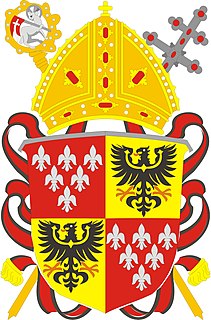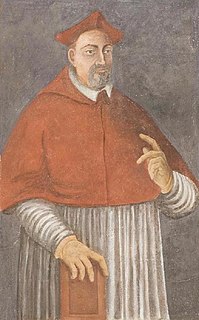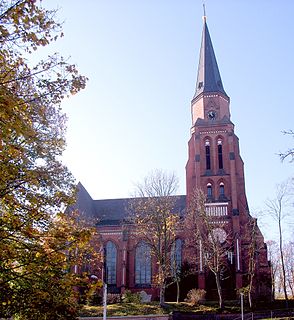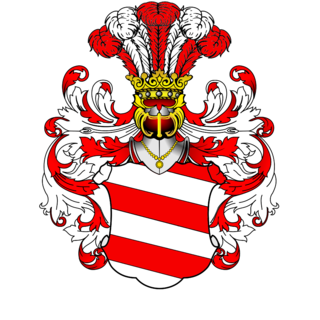
Istria is the largest peninsula within the Adriatic Sea. The peninsula is located at the head of the Adriatic between the Gulf of Trieste and the Kvarner Gulf. It is shared by three countries: Croatia, Slovenia, and Italy. Croatia encapsulates most of the Istrian peninsula with its Istria County.

Pula is the largest city in Istria County, Croatia, and the eighth-largest city in the country, situated at the southern tip of the Istrian peninsula, with a population of 57,460 in 2011. It is known for its multitude of ancient Roman buildings, the most famous of which is the Pula Arena, one of the best preserved Roman amphitheaters. The city has a long tradition of wine making, fishing, shipbuilding, and tourism. It was the administrative centre of Istria from ancient Roman times until superseded by Pazin in 1991.

The Patriarch of Venice is the ordinary bishop of the Roman Catholic Archdiocese of Venice. The bishop is one of the few patriarchs in the Latin Church of the Catholic Church. Presently, the only advantage of this purely formal title is the bishop's place of honor in papal processions. In the case of Venice, an additional privilege allows the patriarch, even if he is not a cardinal, the use of the colour red in non-liturgical vestments. In that case, the red biretta is topped by a tuft, as is the custom with other bishops who are not cardinals.

The Diocese of Passau is a Roman Catholic diocese in Germany that is a suffragan of the Archdiocese of Munich and Freising. Though similar in name to the Prince-Bishopric of Passau—an ecclesiastical principality that existed for centuries until it was secularized in 1803—the two are entirely different entities. The diocese covers an area of 5,442 km².

The Patriarchate of Aquileia was an episcopal see in northeastern Italy, centred on the ancient city of Aquileia situated at the head of the Adriatic, on what is now the Italian seacoast. For many centuries it played an important part in history, particularly in that of the Holy See and northern Italy, and a number of church councils were held there.

The Archdiocese of Wrocław is a Latin Church ecclesiastical territory or archdiocese of the Catholic Church centered in the city of Wrocław in Poland. From its founding as a bishopric in 1000 until 1821, it was under the Archbishopric of Gniezno in Greater Poland. From 1821 to 1930 it was subjected directly to the Apostolic See. Between 1821 and 1972 it was officially known as (Arch)Diocese of Breslau.
The appointment of bishops in the Catholic Church is a complicated process. Outgoing bishops, neighbouring bishops, the faithful, the apostolic nuncio, various members of the Roman Curia, and the pope all have a role in the selection. The exact process varies based upon a number of factors, including whether the bishop is from the Latin Church or one of the Eastern Catholic Churches, the geographic location of the diocese, what office the candidate is being chosen to fill, and whether the candidate has previously been ordained to the episcopate.
The Archbishop of Dublin is the title of the senior cleric who presides over the Archdiocese of Dublin. The Church of Ireland has a similar role, heading the United Dioceses of Dublin and Glendalough. In both cases, the Archbishop is also Primate of Ireland. The Archbishop has his seat at Saint Mary's Pro-Cathedral, though formally Dublin's cathedral is still Christchurch Cathedral, Dublin as recognised by the Holy See. From 29 December 2020 until 2 February 2021, the position had been vacant, as Diarmuid Martin having resigned after turning 75, as canon law required of him. Dermot Farrell was installed as the new Archbishop of Dublin on 2 February 2021.

Francesco Pisani was an Italian Cardinal, born in Venice, the son of Alvise Pisani the noted banker, who was Procurator of S. Mark's, a member of the Council of Ten, and a Councilor of the Doge of Venice; and Cecilia Giustinian. He had a brother named Giovanni (Zuan), who also became Procurator of S. Marks' and was a Venetian diplomat; he was married to the sister of Doge Andrea Gritti. He was a strong supporter of the alliance between Venice, France and the Papacy, called the League of Cognac. He shared the imprisonment of Pope Clement VII in the Castel S. Angelo during the Sack of Rome and its aftermath. He spent eighteen months in exile in Naples while Clement made his peace with the Emperor Charles V.

The Diocese of Görlitz is a diocese of the Roman Catholic church in Germany. The current ordinary is Wolfgang Ipolt

The House of Loredan is a Venetian noble family of supposed ancient Roman origin, which has played a significant role in shaping the history of the entire Mediterranean. A political dynasty, the family has throughout the centuries produced a number of famous personalities: doges, statesmen, magnates, procurators, providures, podestàs, military commanders, naval captains, church dignitaries, writers and lawyers.

The Roman Catholic Diocese of Novaliches is a diocese of the Latin Church of the Roman Catholic Church in the Philippines. The diocese was created by Pope John Paul II on December 7, 2002 by virtue of his Apostolic Constitution Animarum Utilitati, and was canonically erected on January 16, 2003 from the Archdiocese of Manila. The diocese previously existed as the Ecclesiastical District of Quezon City-North, which was renamed the District of Novaliches in 2002.

The House of Pola is an Italian noble family currently living in the Czech Republic. The origins of the House of Pola date back at least until 990. The name of the family refers to the town of Pula in Istria County, Croatia, which was in their possession from 1271 until 1331.

The Lordship of Utrecht was formed in 1528 when Charles V of Habsburg conquered the Bishopric of Utrecht, during the Guelders Wars.
Istria is the largest peninsula in the Adriatic Sea. The peninsula is located at the head of the Adriatic between the Gulf of Trieste and the Bay of Kvarner. It is shared by three countries: Croatia, Slovenia, and Italy.
The Roman Catholic Diocese of Novigrad was a Latin rite diocese located in the city of Novigrad, Istria, Croatia until it was suppressed to the Diocese of Trieste in 1831.

The following is a list of all 422 of the Chief Executives of Pula ordered by the dates of their mayoral terms which are put in parentheses.
Antonio Santin, was an Italian bishop of the Roman Catholic Church. He was Bishop of Rijeka, Bishop of Koper (Slovenia), Bishop of Trieste (Italy), and was created Archbishop ad personam.
Giovanni Loredan was a Venetian nobleman of the Loredan family. He served as the Bishop of Capo d'Istria from 1390 until his death on the 11th of April, 1411.
Loredan is a Venetian surname. The House of Loredan is an aristocratic Venetian family that included various doges of the Republic of Venice, and the surname is almost exclusively associated with the family. The surname most likely originated from the toponym Loreo, which itself originated from its Latin name Lauretum, meaning laurel. Another theory of the origin of the surname, though most likely legendary, is that it comes from the Latin epithet Laureati, given to ancestors of the Loredan family due to their historical glory in ancient Rome and the many victories they achieved in battles. The surname is spelled Loredano in Italian, Lauredano or Lauredanus in Latin, and Lorentano (Λορεντάνο) in Greek, though it is also historically found as Lordis (Λορδᾶς) and Lordano (Λορδάνο). The feminine name Loredana, common in Italy and Romania, was likely inspired by the surname.












